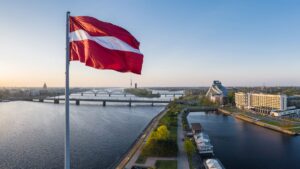
The overwhelming majority of Ukrainians have a positive attitude towards Latvia, which indicates a consistently high level of sympathy for this country. These are the results of a sociological survey conducted by Active Group in collaboration with the Experts Club analytical center.
According to the results, 72.7% of respondents rated Latvia positively (41.0% — completely positive, 31.7% — mostly positive). A neutral attitude was expressed by 21.3% of respondents, while only 5.3% declared a negative position (2.3% — completely negative, 3.0% — mostly negative). Only 0.7% of respondents said they had no information about this country.
“The survey results show an extremely high level of trust and sympathy among Ukrainians towards Latvia. This country is perceived not only as a political ally, but also as a partner that consistently supports Ukraine in the international arena,” said Alexander Pozniy, head of Active Group.

In turn, Maksim Urakin, co-founder of Experts Club, drew attention to the economic indicators of bilateral trade.
“According to the results of the first six months of 2025, trade turnover between Ukraine and Latvia reached $263.9 million. Ukrainian exports amounted to $154.2 million, while imports amounted to $109.7 million.
The positive balance amounted to more than $44.5 million, which favorably distinguishes Latvia among Ukraine’s other trading partners in the EU,” the expert emphasized.
Thus, Ukraine and Latvia not only maintain a high level of mutual sympathy, but also demonstrate balanced and mutually beneficial trade and economic cooperation.
The full video can be viewed at: https://www.youtube.com/watch?v=YgC9TPnMoMI&t
You can subscribe to the Experts Club YouTube channel here: https://www.youtube.com/@ExpertsClub
ACTIVE GROUP, BALTIC STATES, EXPERTS CLUB, LATVIA, Pozniy, SOCIOLOGY, TRADE, UKRAINE, УРАКИН

A survey conducted by Active Group in collaboration with Experts Club in August 2025 revealed an exceptionally high level of positive sentiment among Ukrainians toward Sweden.
According to the results, 76.3% of respondents expressed favor toward this country: 41.3% rated it mostly positively, and another 35% rated it completely positively. A neutral position was taken by 21.3% of respondents, while negative assessments were minimal — only 2.3%.
“Ukrainians see Sweden as an example of stable democracy, a socially oriented state, and one of the most consistent allies in supporting Ukraine. This explains why this country is among the leaders in terms of positive perception,” emphasized Alexander Pozniy, head of Active Group.
At the same time, Maxim Urakin, co-founder of Experts Club, drew attention to the economic aspect.

“Despite the extremely high level of sympathy, trade between Ukraine and Sweden remains rather modest. At the end of the first half of 2025, bilateral trade amounted to only $418 million. Exports from Ukraine amounted to about $41 million, while imports of Swedish goods exceeded $376 million. This resulted in a significant negative balance of over $336 million. This means that Ukraine has the potential to intensify cooperation, especially in the fields of mechanical engineering and woodworking, where Sweden is one of the world leaders,” he stressed.
Thus, Sweden combines a high level of public support with new economic opportunities for Ukraine.
The full video can be viewed at:
You can subscribe to the Experts Club YouTube channel here:
ACTIVE GROUP, EXPERTS CLUB, Pozniy, SOCIOLOGY, SWEDEN, TRADE, UKRAINE, URAKIN
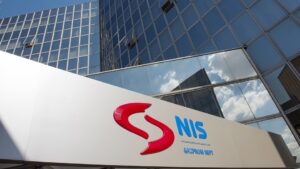
According to Serbian Economist, Serbian NIS has again submitted a new request to the US Treasury Department to extend a special license allowing it to postpone the full application of sanctions and continue the company’s operations after September 26, 2025, when the previous permit expires.
According to the company, the request was sent on September 18. Earlier, on March 14, NIS also sent a request to the US agency to be removed from the SDN (Specially Designated Nationals) list, but this process is lengthy and complicated.
Since 2022, the application of sanctions against NIS has been postponed six times on the basis of special licenses issued by the Office of Foreign Assets Control (OFAC) of the US Department of the Treasury.
Serbian President Aleksandar Vučić, in an interview with Blic TV, expressed concern that further delays may not follow.
“I am afraid that there will be no more delays and we will find ourselves in an extremely difficult situation,” he said.
According to Vučić, during his visit to the US, including a meeting with Secretary of State Marco Rubio, he intends to seek help in resolving this issue.
NIS is Serbia’s largest energy company, controlled by Russia’s Gazprom Neft (56.15%) and the Serbian government (29.87%). The company accounts for the lion’s share of oil refining and fuel production in the country, owns a network of more than 400 gas stations in Serbia and neighboring countries, and plays a key role in the region’s energy security.
Any restrictions against NIS directly affect the Serbian fuel market, state revenues, and transit links in the Balkans, making the issue of sanctions critically important for both Belgrade and the whole of Southeast Europe.
Source: https://t.me/relocationrs/1439
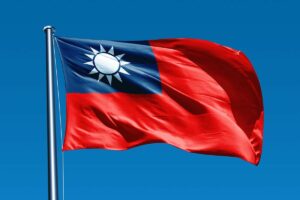
The results of a study conducted by Active Group and Experts Club in August 2025 showed that Ukrainians generally have a favorable attitude toward Taiwan, although a significant portion of respondents remain neutral.
Thus, 41.0% of respondents expressed a positive attitude (12.0% – completely positive, 29.0% – mostly positive). Only 7.7% gave negative assessments, while almost half — 49.0% — took a neutral position, and 2.3% admitted to being insufficiently informed about this country.
“Taiwan is perceived quite evenly in Ukrainian society, without any strong emotions. At the same time, the positive significantly outweighs the negative, which indicates the general open attitude of Ukrainians towards this important player in the global economy,” said Alexander Pozniy, head of Active Group.
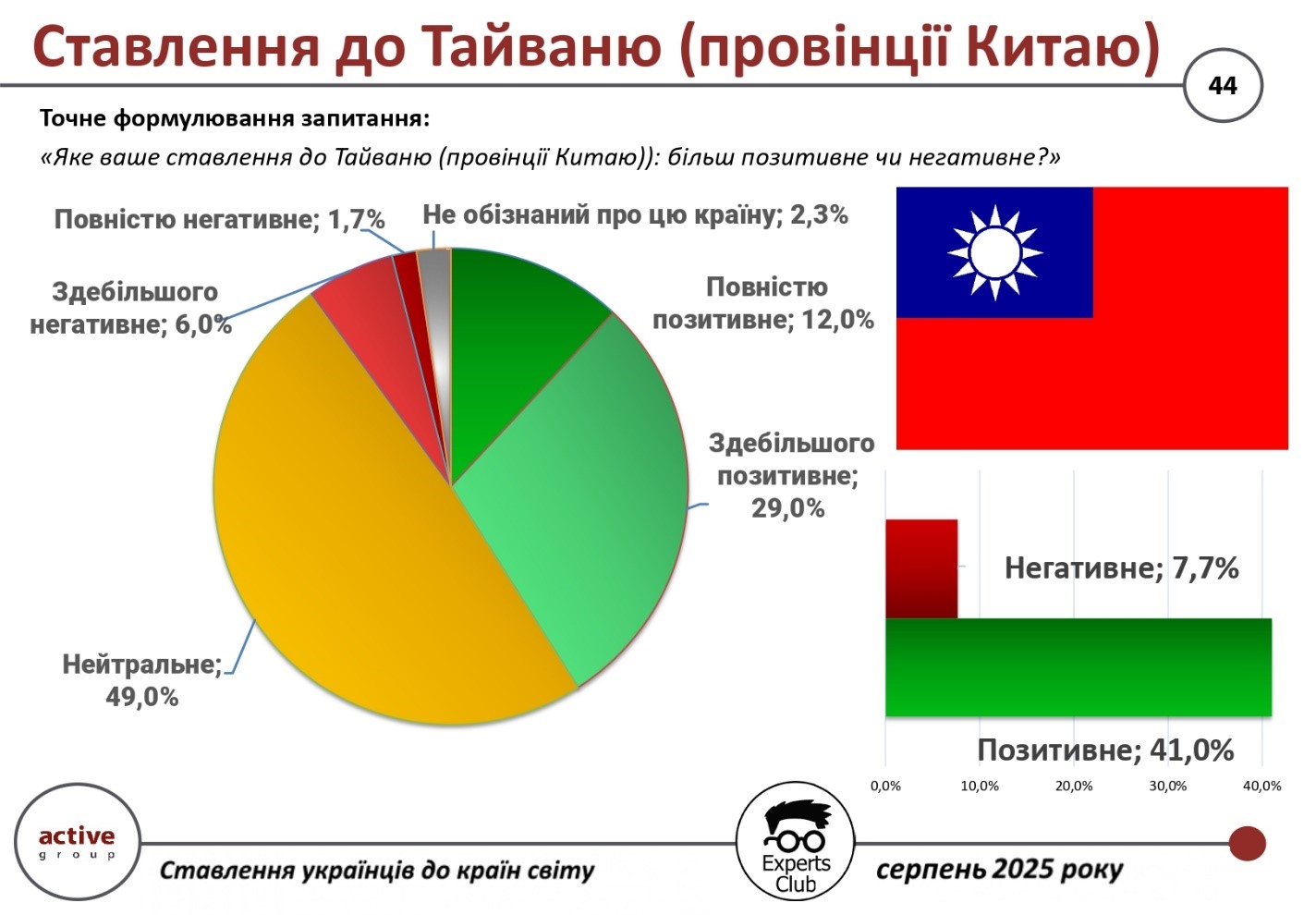
Maksim Urakin, founder of Experts Club, noted that there is a significant imbalance in trade and economic relations between Ukraine and Taiwan:
“According to the results of January-August 2025, trade turnover amounted to about $262.1 million. At the same time, exports from Ukraine amounted to only $8.8 million, while imports from Taiwan amounted to more than $253.3 million. As a result, the negative balance exceeded $244.6 million. This indicates the weak representation of Ukrainian goods on the Taiwanese market,” he said.
Thus, Taiwan occupies an important place in Ukraine’s foreign economic relations, but mainly as a supplier of high-tech goods.
The full video can be viewed at: https://www.youtube.com/watch?v=YgC9TPnMoMI&t
You can subscribe to the Experts Club YouTube channel here: https://www.youtube.com/@ExpertsClub
ACTIVE GROUP, ASIA, EXPERTS CLUB, Pozniy, SOCIOLOGY, TAIWAN, TRADE, UKRAINE, УРАКИН
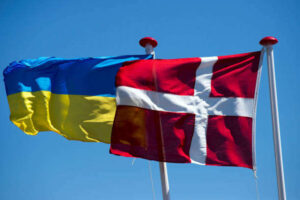
The results of a survey conducted by Active Group and Experts Club in August 2025 show that Ukrainians have a very favorable attitude towards Denmark.
Thus, 73.7% of respondents expressed a positive attitude (33.3% — completely positive, 40.3% — mostly positive). Only 1.3% of respondents gave negative assessments, while 22.7% took a neutral position and 2.3% admitted to being insufficiently informed about the country.
“Denmark is perceived by Ukrainians as a sincere partner and reliable ally in the current circumstances. The high level of trust reflects both humanitarian aid and consistent political support for Ukraine from Copenhagen,” said Active Group CEO Oleksandr Pozniy.
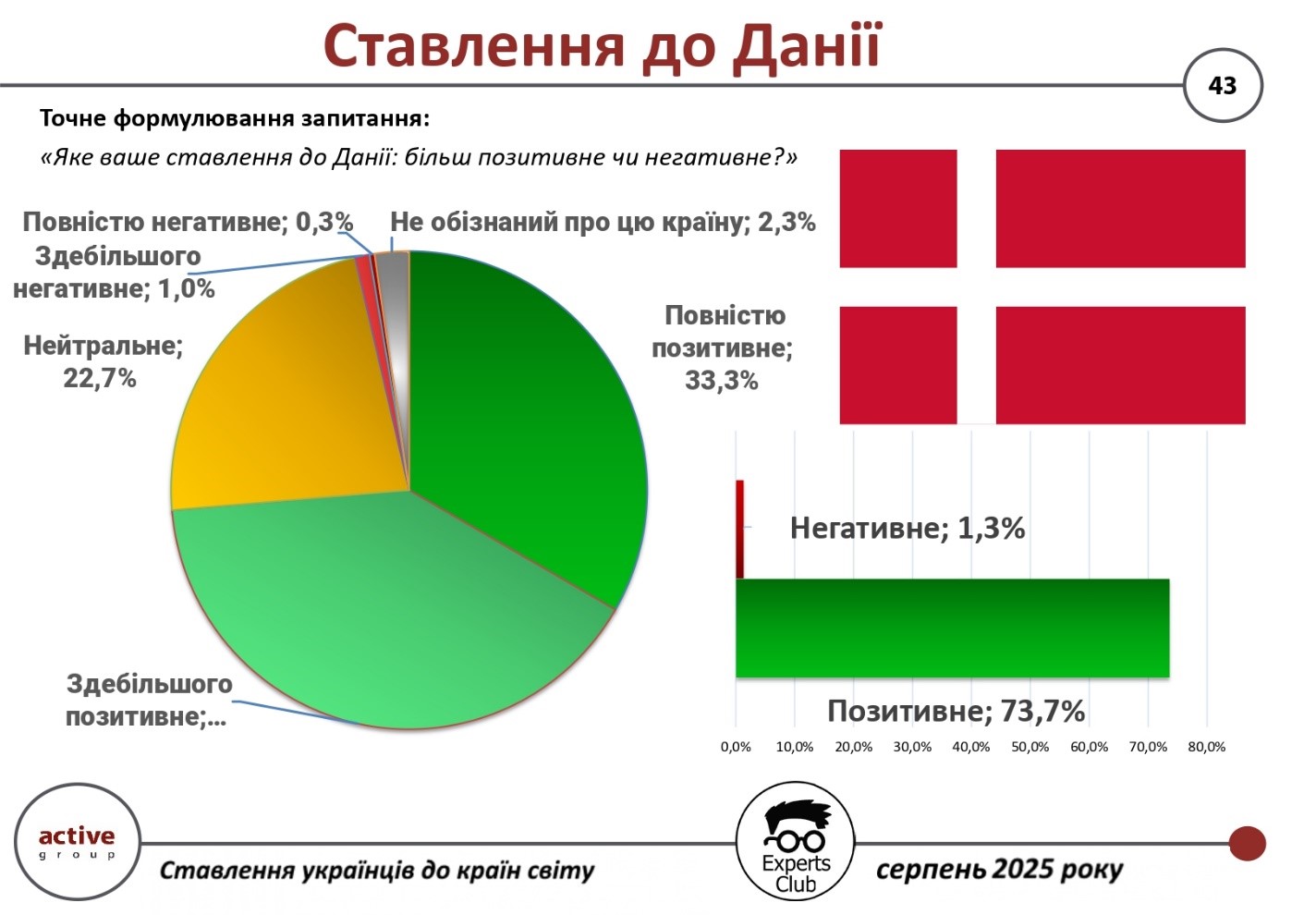
Maksim Urakin, co-founder of Experts Club, analyzed trade and economic indicators:
“According to the results of January-August 2025, trade turnover between Ukraine and Denmark amounted to about $279 million. Exports of Ukrainian goods reached $109.3 million, while imports from Denmark exceeded $169.6 million. As a result, there was a negative balance of $60.3 million. This indicates that, despite very warm public sentiment, Ukraine should work to strengthen its exports to the Danish market,” the expert emphasized.
Thus, Denmark remains one of the most positively perceived countries among Ukrainians, but the economic component of relations requires more balanced development.
The full video can be viewed at: https://www.youtube.com/watch?v=YgC9TPnMoMI&t
You can subscribe to the Experts Club YouTube channel here: https://www.youtube.com/@ExpertsClub
ACTIVE GROUP, DENMARK, EU, EXPERTS CLUB, Pozniy, SOCIOLOGY, TRADE, UKRAINE, УРАКИН
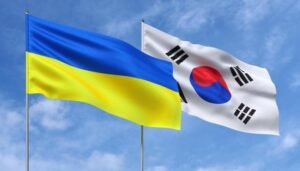
According to the results of a survey conducted by Active Group in collaboration with Experts Club in August 2025, more than half of Ukrainians have a positive opinion of South Korea.
In total, 53.3% of respondents expressed their favorability toward this country (32.7% — mostly positive, 20.7% — completely positive). A neutral attitude was recorded in 30.7% of respondents, while negative assessments accounted for 13.3%. Another 2.7% said they were not familiar enough with this country.
“South Korea is perceived by Ukrainians as a modern, high-tech country that is developing dynamically while preserving its cultural identity. Ukrainians see it as a potential partner, especially in the fields of technology, education, and innovation,” said Active Group CEO Oleksandr Pozniy.
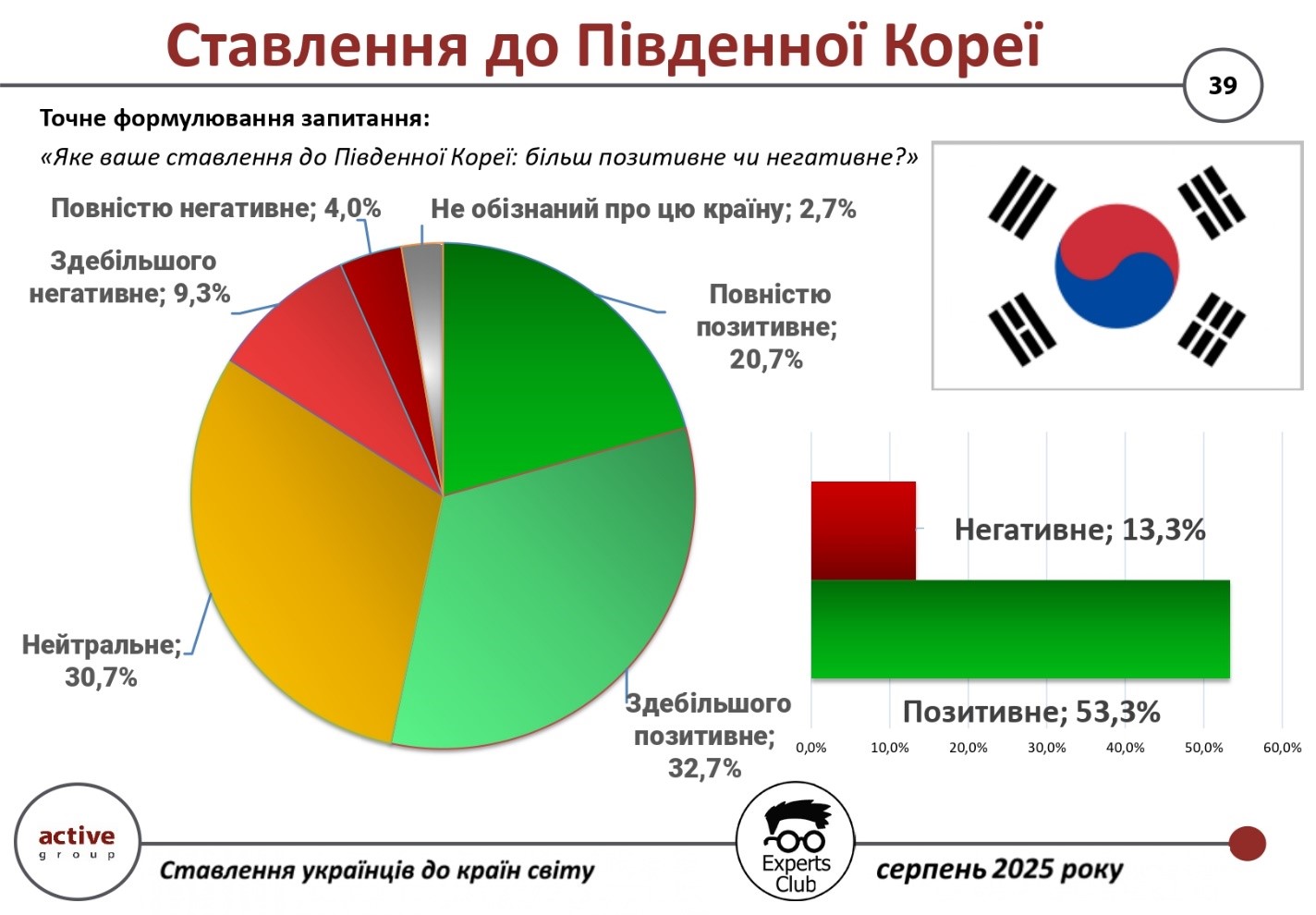
At the same time, Maksim Urakin, co-founder of Experts Club, emphasized the economic dimension of bilateral relations:
“At the end of the first half of 2025, the total trade turnover between Ukraine and the Republic of Korea amounted to more than $518 million. Exports of Ukrainian goods amounted to only $96.9 million, while imports exceeded $421 million.
This resulted in a negative trade balance of $324 million. The situation demonstrates the need for more active promotion of Ukrainian goods on the Korean market, particularly in the agricultural and food sectors,” he stressed.
The study is part of the systematic monitoring of Ukraine’s international relations and public opinion regarding its partners in the world.
The full video can be viewed at: https://www.youtube.com/watch?v=YgC9TPnMoMI&t
You can subscribe to the Experts Club YouTube channel here: https://www.youtube.com/@ExpertsClub
ACTIVE GROUP, EXPERTS CLUB, Pozniy, SOCIOLOGY, SOUTH KOREA, TRADE, UKRAINE, URAKIN